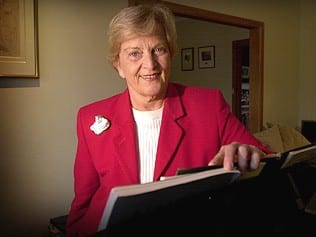Hazel Hawke’s battle with what she called “the Big A” (Alzheimer’s) should by no means define her life of dedicated work to the community.
But the dignity in which she handled and publicly campaigned for the disease was testament to her long-enduring desire to speak out on so much that we’ve found difficult to talk about.
Back in 2003, following her diagnosis, Hawke publicly explained how she was dealing with the illness, declaring that she still very much loved her life. She made public appearances in support of a fund she established with Alzheimer’s Australia to offer support to sufferers, and also featured in her daughter’s book on the issue.
But that was the later part of her life, in examining her legacy it’s important to also consider her early life and how those experiences shaped her views on being pro choice, pro justice and pro women. Particularly, how she not only used her profile as the wife of one of Australia’s most successful prime ministers, but also her charm, intelligence and the courage of her convictions to speak out on community issues that concerned her.
Leaving school at the age of just 14, Hazel fell in love with Bob Hawke. Together, they had four children, one who sadly passed away shortly after birth. They also had an illegal abortion at 22, something Hazel has been open about in sharing her pro choice views, and a decision the pair made to enable Bob to pursue his education and political interests.
There will be many cliches today regarding how Hazel was the “woman behind her husband’s success”. But Hazel was a remarkable and successful woman in her own right.
She worked as an advocate for numerous community causes and with a number of organisations over the years including the Brotherhood of St Laurence, the Australian Youth Orchestra, Austcare, the NSW Heritage Council, World Wide Fund for Nature, the Australian Television Foundation and Alzheimer’s Australia.
Her work was formally recognised when she was appointed an Officer of the Order of Australia in 2001 for: “the promotion of the reconciliation process, support for continued improvement in the quality of children’s television, as a contributor to the preservation of heritage items, and involvement with environment and wildlife preservation groups.”
But for all her achievements and community work, Hazel’s life must have also been painful — dealing with the loss of a child, a daughter with a drug addiction, and a life partner who was a successful politician but not always the greatest husband.
Perhaps this is why she was so well loved. Her problems were real, she spoke about them, she shared her loss and her pain. Women could relate.
Wendy McCarthy, a longtime friend of Hazel, told 7:30 last night that people could certainly relate to Hazel. She had an endearing, humble presence that could bring out the best in all of us. She was a formidable force to have on your side and had enough life experience to trump any amount of formal education she may have been concerned about not having.
“She had that capacity to make people feel … they can find their noble purpose in a way. There’s something about their inner soul and they felt able to talk to her about it without feeling silly. It’s a very unusual and rare capacity.”
McCarthy said the best way Australians can remember Hazel is to donate to the Hazel Hawke Alzhemier’s Research and Care Fund.






